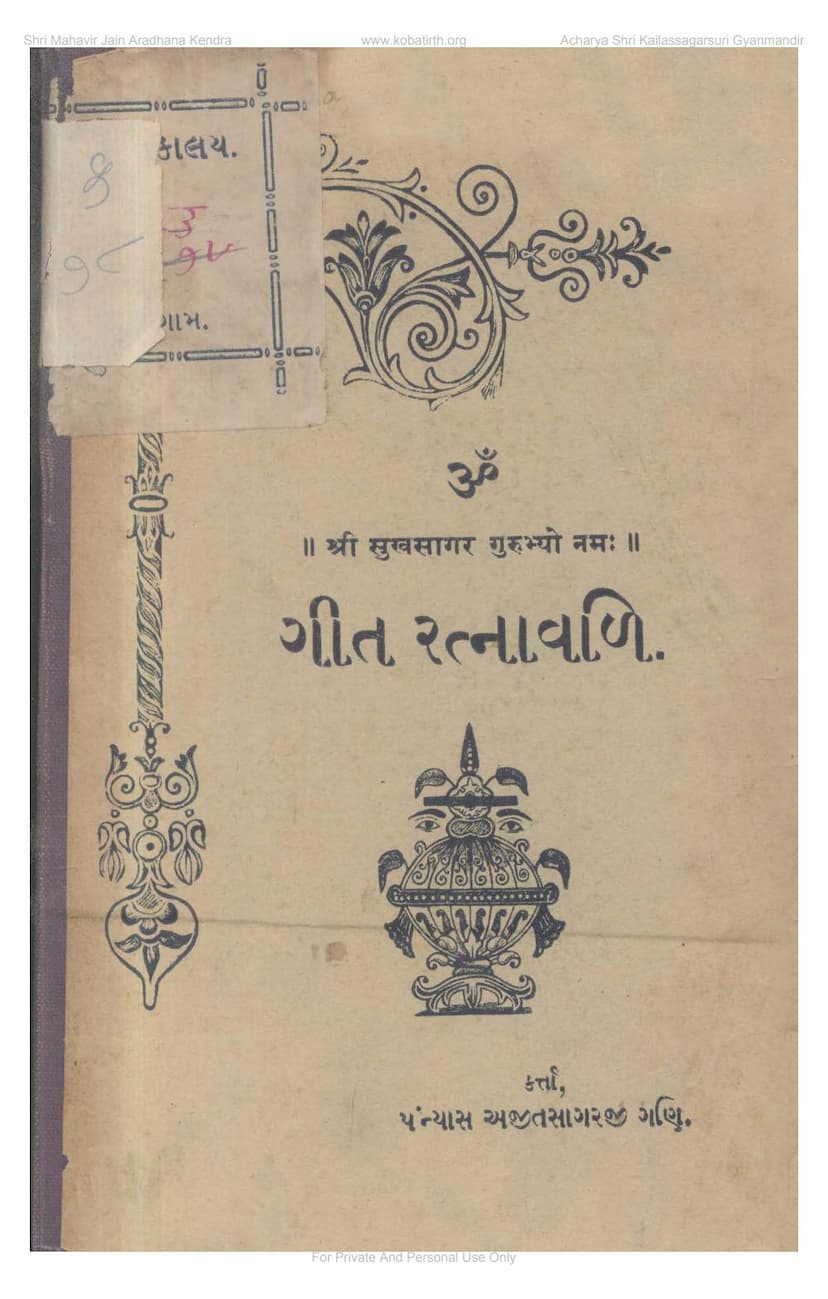Geet Ratnawali
Added to library: September 1, 2025

Summary
Here's a comprehensive summary of the Jain text "Geet Ratnawali" by Ajitsagarsuri, based on the provided pages:
Book Title: Geet Ratnawali Author: Gyansagarsuri Publisher: Shwetambar Murtipoojak Mandal, Prantij Publication Year: Vikram Samvat 2446 (1920 CE) First Edition: 500 copies Price: ₹4-0
Overview:
"Geet Ratnawali" is a collection of devotional songs, hymns, and poetic verses compiled and published by the Shwetambar Murtipoojak Mandal of Prantij. The book features the spiritual compositions of the renowned speaker and preacher, Gyansagarsuri. The preface highlights the purpose of this collection: to make accessible to the public the scattered verses and poems of Gyansagarsuri, whose wisdom and eloquence were highly appreciated.
Key Themes and Content:
The preface emphasizes that the collection primarily consists of verses written in simple and accessible language, following traditional devotional tunes and melodies. This approach is considered more effective and engaging for the general public, especially those who may not be well-versed in complex poetic meters (Pingal).
The primary focus of the verses is religious and spiritual, with a strong emphasis on Vairagya (detachment) and Bhakti (devotion). While some verses might initially appear to touch upon worldly sentiments, their deeper meaning is rooted in spiritual and philosophical concepts. The preface draws a parallel to the works of great saints like Anandghanji, Chidanandji, and Yashovijayji Upadhyay, who often used the metaphor of a husband and wife to describe the soul's relationship with the divine. Gyansagarsuri's compositions also follow this tradition, using evocative language and imagery.
The collection is designed to be accessible and beneficial to all, including women, as many verses are set to simple ragas and use straightforward language.
Structure and Subject Matter:
The "Anukramanika" (Table of Contents) reveals a wide range of topics covered in the book, indicating its comprehensive nature:
- Devotional Praises: Verses dedicated to the praise of Lord Mahavir and other Tirthankaras (Parshvanath, Mallinath, Neminath, Rishabhnath, etc.).
- Spiritual Guidance and Enlightenment: Numerous songs offer advice and teachings to the soul, mind, and living beings on various aspects of spiritual practice, such as:
- The impermanence of the world.
- The importance of devotion and detachment.
- The nature of the soul and the self.
- The fleeting nature of material possessions and relationships.
- The dangers of worldly attachments and desires (fashion, greed, lust, anger).
- The significance of a Guru and spiritual guidance.
- The path to liberation and true happiness.
- Ethical Teachings: Verses address moral conduct, virtues like compassion, truth, brotherhood, service, and knowledge. There are specific admonitions for Shravakas (lay followers) and Shravikas (laywomen).
- Celebration of Jain Festivals: Mention of verses related to festivals like Diwali (Dipotsav).
- Philosophical Explorations: Discussions on the nature of reality, the mind, and the relationship between the body and soul.
- Praise of Gurus: Several hymns are dedicated to the glory and teachings of spiritual preceptors.
- Specific Jain Practices: Glorification of idol worship (Murti-puja) and adherence to Jain principles.
- Personal Reflections and Prayers: Verses expressing personal devotion, seeking divine intervention, and reflecting on life's journey.
Musical and Literary Style:
The preface mentions that many of the poems are set to traditional tunes and ragas, making them suitable for singing and devotional singing. The language is described as simple and clear, avoiding overly complex vocabulary or poetic structures. Literary devices like alliteration (varnanupras) and metaphors/similes (alankar and upama) are noted as being effectively used to create vivid imagery and convey spiritual messages.
Purpose and Impact:
The ultimate aim of "Geet Ratnawali" is to foster Vairagya (detachment), Bhakti (devotion), Daya (compassion), Satya (truth), Bhratrubhav (brotherhood), Shil (virtue), Seva (service), and Gyan (knowledge) among its readers. The compilers express hope that by thoughtfully reading and internalizing the messages, readers will benefit, and the efforts of the author and publishers will be deemed successful. They also humbly request the readers to overlook any printing or editorial errors.
In essence, "Geet Ratnawali" is a cherished collection of devotional and philosophical songs by Gyansagarsuri, aiming to guide individuals towards a spiritual life through accessible poetry and devotional melodies, promoting virtues and detachment from worldly distractions.